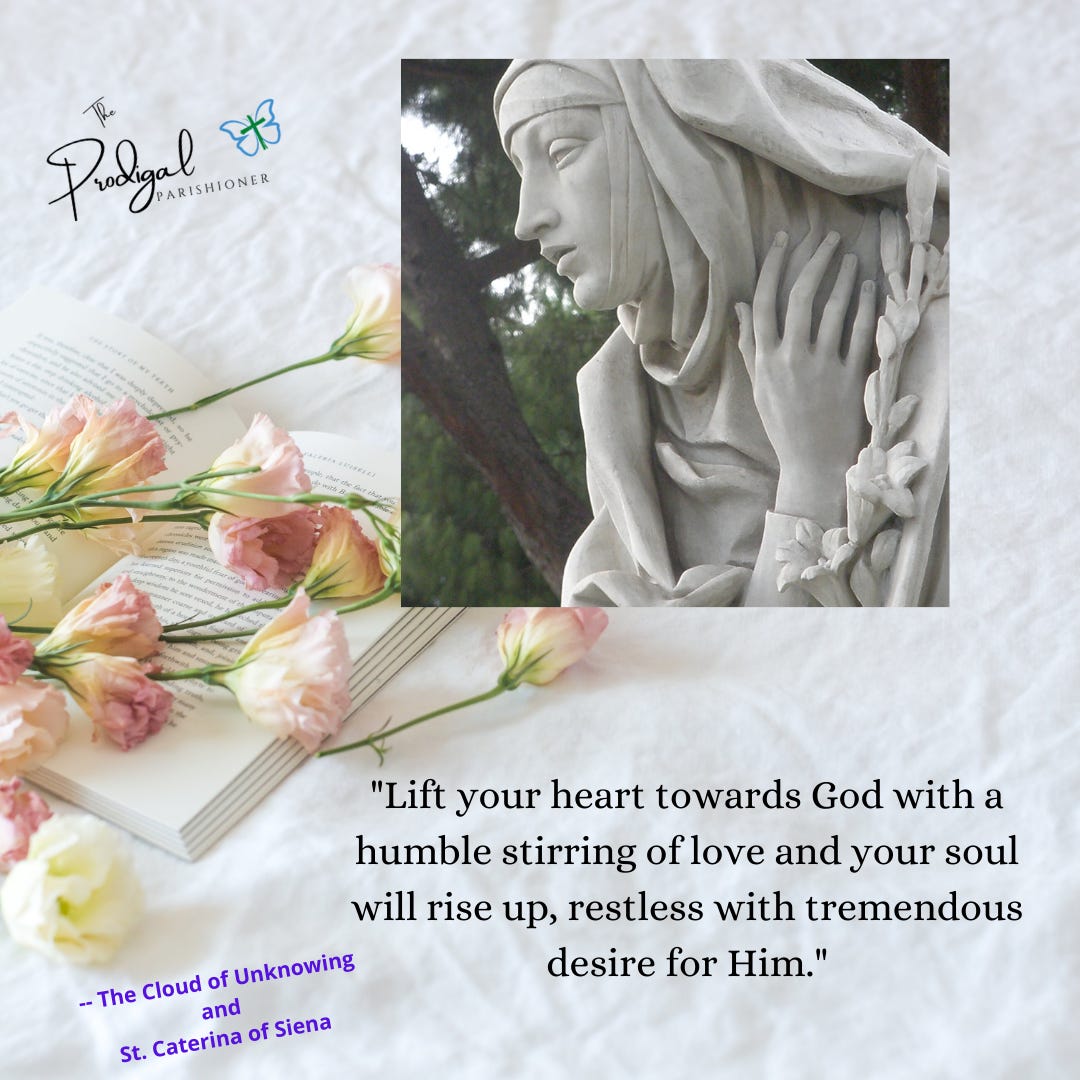Forgiveness After Betrayal: “The Love that Loves to the End”

Once upon a time, I betrayed my Beloved. He was – and now is again – my truest Love, the One who has remained faithful to me always, fully devoted and loving, forever urging me to grow closer to him.
Even so, despite his extreme love and faithfulness, I betrayed him. I publicly and pridefully slandered his name. I left him, and even though he kept making continuous yet gently loving gestures to urge me back home, I ignored him. I stubbornly refused to answer his call.
For years and years, I stubbornly refused. Which is another form of betrayal.
“Have mercy on me, O God, according to your steadfast love; according to your abundant mercy blot out my transgressions.”
(Ps. 51:1)
I can’t say exactly how it happened. I was raised Catholic, and was fervent in my faith and devotions. Yet somehow, at some point, my devotion began to trickle away. I skipped Sunday Mass from time to time, until one day I realized I hadn’t set foot inside a church for months. Sin breeds sin, vice encourages vice, and that act of slipping away caused me to slip even further, until I got to the point that I no longer believed Christ was the Son of God. A great prophet and a man to admire, sure. But God incarnate? I scoffed at that. How illogical!
“One of you will betray me, one of you who is eating with me.”
I proudly made it known to all who would listen that I was “spiritual but not religious.” I became interested in all sorts of alternative spiritualties, including New Age. If you’re not familiar with this movement, all you really need to know is that it’s dangerous, and has a foundation built on one thing: the first, original sin.
Pride.
Those involved in the New Age movement feel they’re more spiritually enlightened than others, and they aren’t afraid to act that way. It’s a horrible, demon-infested belief-system, to be avoided at all costs.
And it’s a betrayal of the True Good, the True Light, the humble Christ who models for us a life of authentic beatitude. “Blessed are the meek, for they shall inherit the earth” (Matt 5:5).
Fast-forward many years. Mercifully, thankfully, by the grace and persistence of the true God of goodness and love, I returned to the Church. Through the Sacrament of Reconciliation, along with a wise and holy priest skilled in spiritual direction and familiar with the evils of the New Age movement, I was purged of my past sins and made clean. Whole. Renewed and rejuvenated.
I became an entirely new person, yet at the same time I simply became the person I had formerly been—a faithful, grateful child of God, devoted once more to my Beloved, Jesus Christ.
I was home, and the God I’d once betrayed not only welcomed me back with opened arms, but with great celebration and tears of joy (Luke 15:7,20-24).
“‘Let us eat and make merry; for this my son was dead, and is alive again; he was lost, and is found.’ And they began to make merry.”
(Luke 15:24)
Fast-forward several more years.
Betrayal.
This time I wasn’t the betrayer, but the one who had been betrayed. I’d finally come to the heart-wrenching realization that someone close had betrayed me. Not once, not twice, but just as I had done to Christ, the betrayal had been repetitive and continuous.
My life has changed so much since all this happened. My entire worldview and my faith in humanity came crashing down, and still remains cracked and damaged. If I can’t trust a close friend, who can I trust?
I won’t go into details about my journey toward wholeness and healing, because that’s not necessary (and it’s still a work in progress). The point of this article isn’t to dwell on the betrayal, but rather the forgiveness of Christ, a forgiveness he modeled for us and expects us to extend to others.
I’ve struggled with forgiving this person. He’s making reparation and has apologized to those who have been hurt by his actions. After a lot of difficult self-work on his part, I’m coming to believe that the change is real. Trust will be a long time in coming—it has to be earned, over a great deal of time—but forgiveness is another matter.
Forgiveness, the love that loves to the end, becomes a living reality. It is not in our power not to feel or to forget an offense; but the heart that offers itself to the Holy Spirit turns injury into compassion and purifies the memory in transforming the hurt into intercession.
(CCC 2843)
Forgiveness cannot be forced or coerced. It takes time, healing, and above all prayer.
A lot of prayer.
Forgiveness is the art of giving—of giving to ourselves, to our healing, and to our spiritual growth. It’s letting go of anger and resentment, and dissolving any desire for revenge or payback. It’s a release and a relief.
What forgiveness is not is a memory eraser, nor should it be. “Forgive and forget” is an unhealthy attitude, because it’s impossible to forget excruciating trauma, nor should we try. “Forgetting” in this way is merely burying things rather than healing them—or healing from them. In order to heal, we can’t avoid our pain. We have to walk directly through the scorching heat of the recovery process. Even after we fully heal, we won’t magically forget the trauma we’ve endured. Instead we’ll remember it and acknowledge how we’ve grown from the suffering we’ve been through. This allows us not only to avoid similar situations in the future, but also to feel a healthy sense of much-needed empowerment and self-worth, an acknowledgment of the immense strength it takes to emerge from victim to resilient survivor.
Forgiveness was something I longed for, but couldn’t quite reach—at least not on my own. Jesus said, “ask, and it will be given you” (Matt 7:7). So, I asked.
Kneeling in prayer after receiving Christ’s True Presence in the holy Eucharist, I continued my prayer for healing and the ability to fully forgive in a true, charity-enriched sense.
“Create in me a clean heart, O God, and put a new and right spirit within me.”
(Ps. 51:10)
In the depths of my heart, “where everything is bound and loosed” (CCC 2843), Jesus spoke to me. Suddenly, in a flash of pure charity—His charity, “the greatest of these” (1 Cor. 13:13)—the Holy Spirit brought into my mind the parable of “the unmerciful servant” (Matt. 18:23-35). This was the guy whose financial debt was forgiven by his Master—but then he turned around and demanded repayment for a lesser debt that was owed him by another. When the Master found out, he was justifiably enraged.
“Then his lord summoned him and said to him ‘You wicked servant! I forgave you all that debt because you pleaded with me; and should not you have had mercy on your fellow servant, as I had mercy on you?’ And in anger his lord delivered him to the jailers, till he should pay all his debt.”
It was then that my soul was released and elevated. The weight of despair at not being able to forgive was, by another grace of God, lifted.
I’d betrayed Jesus in the most horrible, grievous way. My friend betrayed me in a horrible, grievous way.
Since Christ has forgiven me fully, who am I to allow grudges, unforgiveness, or despair to grow within my soul? Since God has forgiven such an enormous debt, how can I not forgive my friend a lesser debt?
This is what Jesus teaches. It’s what he wants. It’s what he demands, even. God incarnate came to earth to provide us with an undeniable map to the moral life. Who am I to argue his truth? I was foolish enough to do that once. Never again.
I’m still in the process of learning to trust this person, because as I said, that takes time. And a lot of it. He has to prove himself trustworthy before that aspect of our friendship can resume—yet forgiveness is a different matter altogether. I won’t forget what was done, nor should I. Yet neither will I seethe over it, or stir up hatred and resentment within my heart. Forgiveness is the key to healing. And I want to fully heal.
“And forgive us our trespasses as we forgive those who trespass against us.”
(Matt 6:12)
If we don’t forgive, we’re not forgiven. It’s as simple as that. After a huge betrayal, forgiveness will take time, healing, and patience. It’ll take prayerful persistence. It’ll take the grace of the Holy Spirit.
And it’ll uplift the soul.







"Yet somehow, at some point, my devotion began to trickle away. I skipped Sunday Mass from time to time, until one day I realized I hadn’t set foot inside a church for months. Sin breeds sin, vice encourages vice, and that act of slipping away caused me to slip even further, until I got to the point that I no longer believed Christ was the Son of God."
There is a poem by Alexander Pope:
'Vice is a monster of so frightful mein,
as to be hated, needs but to be seen
but seen to oft, familiar with its face,
we first endure, then pity, then embrace'
This is a very heart-wrenching piece. Forgiveness is very challenging. A lot of people confuse forgiveness with reconciliation. "How can you forgive after so and so did xyz to you?" I like to think of anger or resentment as a fire, and we are standing on it. It burns us, it burns hot, when we are first betrayed. But to forgive is to decide not to add on to the flames. To let them take time to burn low, and eventually go out. If we refuse to forgive, we will continue to add fuel to the fire, and it will burn hotter, and burn us faster. In short: forgiveness is a unilateral and individual act. Reconciliation requires the work of the other party to "confess their sins, do penance, and amend their lives". This feels simple enough in a confessional but much harder to do when it is between people, especially people we love.
Salvation history is the story of a loving shepherd refusing to abandon a people who hate him. He teaches us, slowly, of what he is capable of; he teaches us, slowly, of how much he loves us, culminating in a final act of sacrifice that cannot be matched--he gave us a perfect sacrifice to pay an infinite debt. Even though *we murdered God*, God still loves us perfectly, and individually.
I have had to learn this lesson myself. I was not raised Catholic, I came into the Church in 2018. I emerged somehow from a family that feels fraught with similar betrayal. My parents nearly divorced due to acts of infidelity--it took forgiveness from the one and repentance from the other for the wound to heal. One of my siblings is estranged--this has, oddly, been the more difficult wound for me to let go of. But all healing begins with forgiveness. We can't heal until we stop burning ourselves.
Thank you for this essay--lots to chew on. God bless you! I will be praying for healing for both of you.
They say that forgiveness is a process, and I think it's the same whether we're the ones forgiving or we're the ones being forgiven. The difference with Jesus is that He forgives us I think the moment we sincerely repent from our sins, though it takes some time before it fully sinks in.